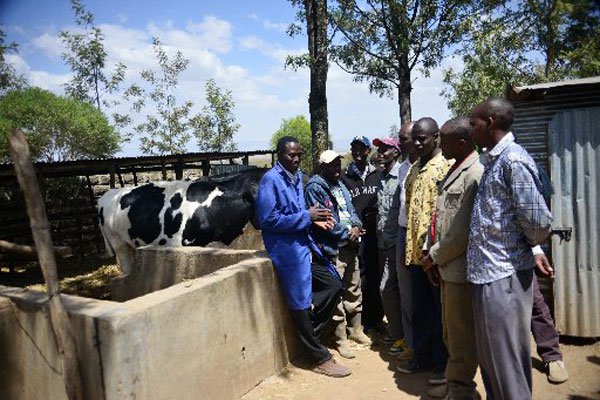Milk Farming in Kenya: Geoffrey Kariuki, an aesthetic doctor trained in the UK wanted to try out something new after working for just five years.
His colleagues and relatives expected him to set up a private clinic. But they were in for a surprise when he instead used his savings to buy a Friesian cow and calf at Pokea farm, in Njoro, Nakuru County.
His idea of dairy farming in a semi-arid area did not look viable and warnings from his friends couldn’t stop him either.
Today, the Sh. 280,000 seed capital he used to buy his stock has seen him emerge as one of the highest milk producers in Nakuru County.
How ex-matatu driver makes Sh. 800,000 monthly from his dairy farm
“I wanted to do something different. I love dairy farming and since my childhood, my passion has been dairy farming,” he told Money.
“I started off with two animals but my herd has increased to 17, five of which are pedigree cows. In a good month, I earn Sh. 250,000 from milk which has turned me into a millionaire,” said Mr Kariuki who delivers his produce at Brookside’s Kiptang’wany cooling plant. “Every year, I make Sh. 3 million.”
“What makes me happy is that I am doing something, which gives me satisfaction and above all, it gives me a lot of joy as I have convinced other farmers to start dairy farming in an area that is known for its harsh climate,” said the University of Hertfordshire graduate.
His farm at Miti Mingi in Elementaita, about 40 kilometres off Nakuru-Nairobi highway is a beehive of activity as farmers from across the country come seeking fresh ideas on how to boost production.
“Many farmers, particularly from dry areas visit my farm to learn how I have managed to stay afloat. However, I don’t charge them,” he said.
From his current lactating stock, he gets an average of 350 to 400 litres of milk each day. He milks them at least four times a day and sells a litre at Sh34 to Brookside. The proceeds have seen him acquire a brand new pick-up at Sh3.4 million, which he uses to deliver the milk.
“I deliver 700 litres of milk from other farmers to the cooling plant, which earns me extra money. I charge the farmers Sh4 for every litre of milk I transport,” he said.
He sells heifers at between Sh180,000 and Sh250,000.
“I sell between three and five heifers every year,” says the farmer who is currently insuring his animals.
To get healthy offspring, he buys semen from Germany at between Sh7,000 and Sh9,000 each to serve the cows, a plan that he says ensures he gets female calves. “I started with two acres but today I have 15, which I plan to increase as I expand my herd to 200 in the next five years,” said Mr Kariuki.
But it has not been a walk in in the park for the dairy farmer to realise his roaring success.
“Dairy farming needs a lot of commitment and close monitoring as the cows are like children, who need maximum attention and care,” he says.
“I invite a veterinary doctor, whether the animals are sick or not, at least twice a week.”
But what is his secret? Mr Kariuki uses the best animal husbandry practices. To begin with, he feeds his cows with millet and sorghum silage.
“Miti Mingi is an arid place and maize silage is scarce that is why I switched to sorghum and millet, which I mix with napier grass, lucerne, oats, dairy meal, salt and molasses in equal ratio,” he explains, adding that feeding is an area in which many dairy farmers score poorly.
“You have to group your animals so that you feed them according to their needs. We feed a cow that produces an average of 40 litres of milk 40kg silage while those producing less require less concentrates. We feed them between 20kg and 25kg of silage,” he said.
He says hygiene is crucial. This is why he cleans the cowsheds at least twice a day to ward off mastitis and other diseases.
Water is essential in any dairy farm. Mr Kariuki has constructed a 30,000-litre water tank that ensures his farm has a reliable supply of clean water. He has employed two workers who are trained on animal husbandry. Milk Farming in Kenya. Milk Farming in Kenya.









